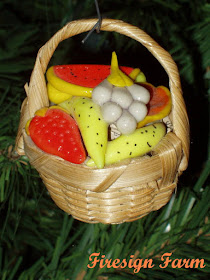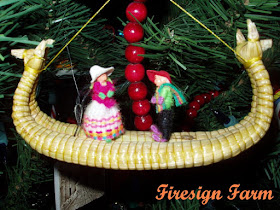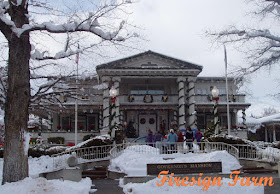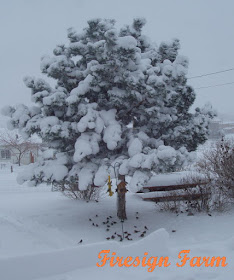Earlier this year when posting here about my
pepper pantry, I mentioned that I would be growing extra jalapenos this summer to replenish my chipotle (che-POAT-lee) supply. I promised I would post instructions for putting together a make-shift smoker, and turning jalapeno peppers into chipotles.

Start with ripe jalapeno peppers, ideally those that have turned completely red. This year, we had a late spring, reasonably cool summer, and snow the first week of October. Only a couple of my jalapeno peppers had just started to turn red when I had to pick everything (the golden ones on the left are habaneros - they too were picked green, but are faster to change color).

No problem. Peppers, like tomatoes, will continue to ripen after they're picked if left unrefrigerated. I let the peppers set out on the counter for a couple of weeks. They can set for quite a while, but try to process jalapenos before the stem starts to separate from the body of the chile. Some peppers with thinner walls will continue to ripen and then dry, but jalapenos are too fleshy - they tend to rot before they'll dry. Smoking them is one way to preserve your jalapenos - canning them as nacho slices, or freezing them whole, sliced, or stuffed with a cream cheese mixture to turn into poppers, or whipping up a batch of
jalapeno hot sauce are other options (that link also has a recipe for my habanero-orange hot sauce - my absolute favorite, and why there are also habanero peppers ripening on my counter).

But I digress. We're supposed to be making a smoker to turn jalapenos into chipotles. Commercial smokers, that have been previously used for meat, can give a greasy, and later rancid, taste to the chiles, so it's best to use something just for the chipotles. Unless you're planning on going into the chipotle business, a temporary smoker made from easily acquired items is the way to go. The main thing to remember is that you don't want to cook the jalapenos, but rather let the smoke waft away the moisture in the chiles as it also infuses them with flavor. The best way to do that is to make a separate firebox, and then connect it to your smoking box with a piece of pipe. Of course, the firebox portion has to be able to withstand fire, so I've used some cinder blocks and a piece of steel pipe. I used some crumpled foil to fill in the areas between round pipe and square blocks, but it doesn't have to be perfectly airtight. The smoker section, on the other hand, only has to hold the chiles suspended in the smoke while it acts as an offset chimney, so a cardboard box works fine. In the past, I've found taller boxes (that held a windshield, or a washer) but this year I just picked up a couple of smaller ones. They were two different diameters though, and instead of trying to fit them together, I found a piece of roof vent flashing, set that on the bigger box, then the smaller box, and taped the flaps of the bottom box to the upper box, just in case the wind came up (and notice that there are bricks holding down the flaps of the bottom box for the same reason). For a more primitive option, depending on your soil type, you could dig a firepit and smoke trench, covering both with metal or even rocks, and then add your cardboard smoke box.

Next, you need some way to suspend the peppers in the rising smoke. A pan poked full of holes could work, but isn't ideal - the peppers would tend to steam in their juices more than dry. In the past, I've strung the peppers on lengths of string, and hung that draped across dowels poked through the box. That's not too bad, depending on how you want to use your chipotles. If you're just dropping them whole into a pot of soup, it's ok, but if you're planning on grinding some into powder or making some in adobo sauce the string can be difficult to deal with. A wire basket or a rack that won't allow the chiles to drop through is best. I bent a piece of hardware cloth into a tray, supporting it with the (cut-down) cardboard divider inside the box plus a couple pieces of coat hangers stuck through either end of the box.

The best woods to use for smoking the chiles are from fruits or nut trees. If that's not possible, hardwoods are the next best. You just don't want to use pine, mesquite, or other resinous woods. I lost a nectarine tree to borers this year, and always save the prunings from my fruit trees, so I had a nice supply of smoking wood. The night before, I soaked half the wood pieces so they'd burn slower and cooler. Be aware that once you start up with the smoke, you will be perfuming your entire neighborhood. But smoking chiles smell like food, not smoldering leaves, so the neighbors just might drop by with their mouths watering to see what's going on.

It's always best to be prepared when playing with fire, so I pulled the hose over, on at the faucet and closed off with a twist valve. Aries also brought the fire extinguisher out of the garage, just in case. I started a small fire in my firebox, and while I waited for it to get going, I pulled the stems off the jalapenos and loaded up the basket. I used all my red ones, those partially changed, and then some of the green ones with white corking (very desirable in chipotles - don't ask me why).

Once I had a nice little bed of hot coals in the firebox, I added a couple handfuls of soaked wood and then put a piece of metal over the top, held down with a couple smaller bricks. I sat out to watch for a while, just to make sure everything was holding together ok. Every hour or two, I'd add more wood, and turned the chiles a couple of times.

Low and slow is the way to go with chipotles - both for the best flavor and to ensure ones that will last in storage. It's better to stretch it out over a couple of days than to try and hurry up the process with more heat. Let the fire burn out overnight, and start it up again the next day. I smoked my chiles all day, but rain was forecast for tomorrow. I just pulled the cardboard boxes away from the pipe and set them in the garage for the next day and a half. The photo above is after another afternoon of smoking, and I have them going again this afternoon. If you're in a hurry, the jalapenos will dry faster if cut in half and seeds removed. You can also dry them in a dehydrator or your oven until wrinkled but not stiff, and then smoke them (doing it in reverse will also work, but your house will smell like smoke for days). Finished chipotles are hard, lightweight, and dark brown in color. Ones that are still leathery won't store as long. Once the chipotles are dried, store them in jars with a rubbery seal or in an airtight plastic bag.
To use, drop one into a pot of beans or soup, and remove after cooking (or dice the rehydrated chile and stir bits into the pot to taste). They add a rich, smokey, bit of heat. If you want to grind them into powder, they might need to be dried further, until they can be broken in half. I use lots of mine to make a big batch of
enchilada sauce (pressure-canned) every couple of years. Or make up a batch of chipotles in adobo sauce, rehydrated chipotles pickled in a tomato-based sauce.
 Angel - God's guidance in the home
Angel - God's guidance in the home  For the rabbit, I had a little pottery figurine from my first trip to Mexico (back when all you needed to cross the border was a photo ID and a copy of your voter's registration. A girlfriend and I had lots of time, but little money, so traveled via buses and trains over to, and then down, the Pacific Coast as far as San Blas - quite an adventure). By knotting a bit of gold cord around its neck, it's now an ornament (shown hanging next to some Guatemalan worry dolls glued to a hair barrette - too fragile to wear, I turned that into an ornament too).
For the rabbit, I had a little pottery figurine from my first trip to Mexico (back when all you needed to cross the border was a photo ID and a copy of your voter's registration. A girlfriend and I had lots of time, but little money, so traveled via buses and trains over to, and then down, the Pacific Coast as far as San Blas - quite an adventure). By knotting a bit of gold cord around its neck, it's now an ornament (shown hanging next to some Guatemalan worry dolls glued to a hair barrette - too fragile to wear, I turned that into an ornament too). I think the strangest one, and one of the last ones I found, is my fruit basket. I found this in a little curio shop in Willamstad, capital of the Caribbean island of Curaçao in the Netherlands Antilles. It was so bizarrely strange, I knew it would be perfect. A little more than an inch across, I especially love that the strawberry, bananas, and slice of watermelon are all the same size. I'm not sure if those are grapes, or maybe breadfruit. There's also a slice of papaya and something that looks like a Delicata squash on the other side - a wonderful little piece of folk art.
I think the strangest one, and one of the last ones I found, is my fruit basket. I found this in a little curio shop in Willamstad, capital of the Caribbean island of Curaçao in the Netherlands Antilles. It was so bizarrely strange, I knew it would be perfect. A little more than an inch across, I especially love that the strawberry, bananas, and slice of watermelon are all the same size. I'm not sure if those are grapes, or maybe breadfruit. There's also a slice of papaya and something that looks like a Delicata squash on the other side - a wonderful little piece of folk art.

















































